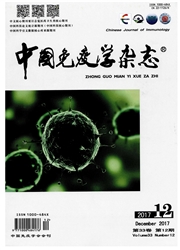

 中文摘要:
中文摘要:
目的:构建乙肝病毒抗原PreS2/S和抗体Fc段的融合分子,观察该抗体化的乙肝疫苗诱导特异性细胞免疫应答的能力及状况。方法:用PCR的方法扩增乙肝病毒抗原PreS2/S和鼠IgG1Fc段基因,依次克隆到载体上;体外转染小鼠肌细胞,观察表面抗原转录水平和蛋白水平的表达情况;基因免疫小鼠,观察其诱导的特异性CTL免疫应答状况。结果:基因克隆融合分子经酶切和测序鉴定构建成功;体外转染实验表明融合分子可以在肌肉细胞中表达;免疫小鼠脾脏细胞用特异性抗原刺激后能产生很强的细胞免疫应答,其中特异性CTL反应明显增强。结论:基于抗体Fc段的抗体化乙肝疫苗能增强机体对HBV的特异性CTL反应,有利于打破HBV感染导致的免疫耐受。
 英文摘要:
英文摘要:
Objective:To prepare an antibedized HBV vaccine based on HBV PreS2/S and mouse IgG1 Fc fusion molecule, and to analyze the cellular immune response specific against HBV elicited by the vaccine. Methods:The genes ceding for HBV PreS2/ S and mouse IgG1 Fc were amplified by PCR and cloned into pcDNA3 vector for the construction of the antibodized HBV vaccine. C2C12 cells were transfected with this construct, and HBsAg were detected in transcriptional (RNA) and translational (protein) levels by RT-PCR and ELISA, respectively. Mice were immunized intramuscularly and the proliferative and CTL responses of the splenocytes derived from the immunized mice were analyzed by in vitro lymphoproliferation assay and cytotoxic assay. Results:The construction of the antibedized vaccine was verified to be correct. HBsAg could be expressed detected in the transfected C2C12 cells. Splenocytes derived from the immunized mice exhibited robust proliferation response and stronger CTL response to lyse cells expressing PreS2/S compared to those induced by the conventional HBV recombinant vaccine. Conclusion:The antibedized HBV vaccine based on HBV PreS2/ S and mouse IgG1 Fc fusion molecule which can enhance the cellular immune response notably against HBV infection, which might be a promising candidate of therapeutic vaccine to abrogate the immunotolerance of HBV and to treat the chronic hepatitis B patients.
 同期刊论文项目
同期刊论文项目
 同项目期刊论文
同项目期刊论文
 期刊信息
期刊信息
